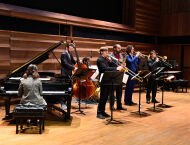Music

Tigers Are Bad For Horses: Native DC Band Seeks to Redefine Musical Comfort Zone
November 1, 2016 @ 12:00am
Tigers Are Bad For Horses sounds like it could be the title of a hardcore metal band. The predatory nature of one of jungle’s mainstays against the docile, meandering attitude of a horse seems like a mismatch in the plains, and it would likely be unbearable to watch if one of each species crossed paths.
When Lyell Roeder, 25, and Mary Ellen Funke, 23, crossed paths however, it was a different story. In 2012, each was in a Georgetown University studio poking at music. Roeder was tinkering with a traditional rock sound, while Funke honed her folk vocals. But the latter was loud, and good, enough to catch the former’s attention.
“I was recording a rock album, and I heard her, so I asked her to record some background vocals,” Roeder says.
It was fun, I was in a folk project at the time and he was in a rock band, and it was fun to try different things and I was excited to do any musical project,” Funke says.
Since then, the band has released numerous singles and an LP, blending their talents into a new sound. Inklings of their original musical projects are present, but subtle. Tigers Are Bad For Horses creates a soothing electronic tune coupled with feathery vocals; perfect for a stroll on the Georgetown waterfront, and perfect for the changing interests of its creators.
“I think it’s different for both of us,” Roeder says. “Neither of us were making the music we were both interested in making. I think I maybe flirted with the production side, but not in a big enough way. So it got to the point where we wanted to start doing stuff that sounded more like Bon Iver… I invited her to make a song with me and it was cool, and then we sort of made one for real.”
Founded in DC, the band has played the majority of their performances in the DMV area including stops at U St. Music Hall, Gypsy Sally’s and Jammin’ Java. Though the group is currently in Los Angeles, the duo reminisces enthusiastically about how the somewhat hidden music scene helped shape them, both in positive and negative experiences. The duo is currently scheduled for a Sofar Sounds show in DC on December 1.
“It definitely started out at Georgetown when we were younger, but I remember my first experience with DC when I was in The Mellens and I was grateful we could go to college in a city where we could grow and expand musically,” Funke says. “The DC scene is mildly reflective of the Georgetown one, in that it’s small and supportive. When Tigers started we met so many people that were so grateful and they lifted us up. It’s growing every year, it’s changed.”
Like their initial genre differences, their introductions to music are also radically different. Funke, who is from Chicago but bounced around, didn’t dabble with the art form until boarding school. There she says everyone experienced “musical independence,” leading her to eventually sing in front of people for the first time at 18-years old, only after hijacking her former roommate’s guitar and learning “Dust in the Wind.”
For Roeder, who grew up outside of Boston, music was a quintessential artifact of his upbringing. With an interest in jazz, rock and pop culture, he claims to have created terrible songs that will never see the light of day.
This contrast allows both to bring personal experiences and touches to their songwriting, a process the duo is currently in the thick of in hopes to produce more singles in the new year. So far, Tigers has released only six official tracks due to time restrictions, but with the recent move to the West Coast, their focus and the allotted time for sitting down and scribbling lyrics has expanded.
“Not too many songs are held back,” Funke says referring to potential unreleased tracks. “We were slow in the beginning because I was still in school and it was hard to find time. Other than that, we write a lot of beginnings to songs and we’re very deliberate. We’re not the kind of band to sit on tracks.”
One reason for the meticulous Tigers’ release schedule is because of how truly collaborative Funke and Roeder remain throughout. Most songs start with an idea from one before undergoing a dynamic back and forth, which either expands on the original sound or changes it altogether.
“It’s sort of anything and everything,” Funke says. “There’s such a very big variance for each song. Some of them I write and bring to him, and vice versa. It depends. I’d say the one constant is we’ll get a bone structure and build it and then we’ll completely rip it up and delete large sections. It’s totally nonlinear.”
“[For example] Our song “Overflown” started as a beat I made five or six years ago,” Roeder says. “I thought it was kind of cool and it sort of became a totally different animal. I ripped out the whole beginning and I pushed it in multiple directions, and it sort of became what it is. I needed Mellen’s production and vocals.”
Another topic of conversation for both is whether to record a full length LP.
“There’s no plan, but we definitely want to,” Funke says. “We debate about this a lot, it’s really hard because the nature of indie music trends toward shorter attention spans. It’s hard to take a year and write a whole album and it’s hard to gauge what people’s interest will be.”






